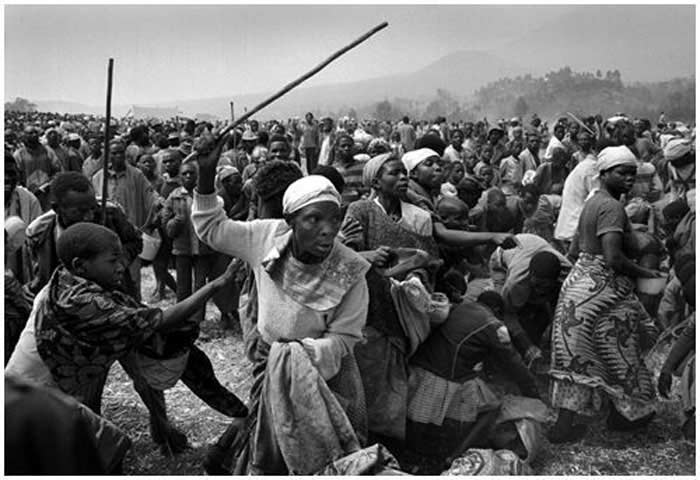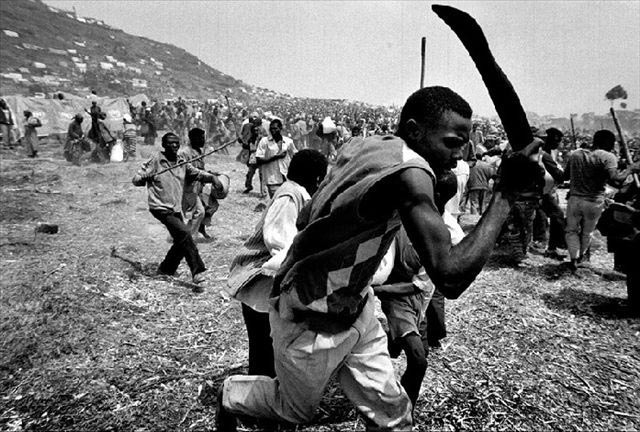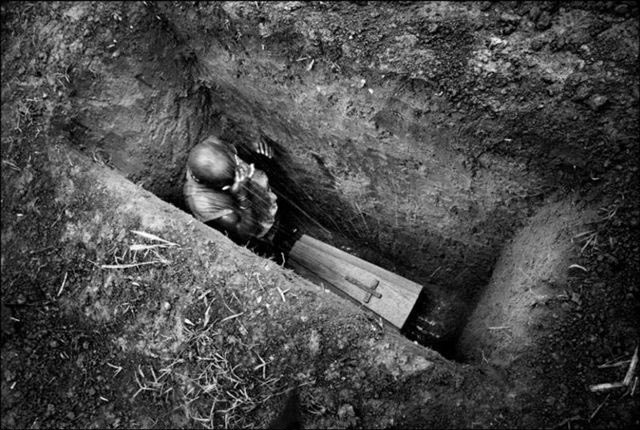There is some inaccuracy in the perception of Felicien Kabuga, who finally ended up in The Hague on charges of genocide. Kabugu is called a propagandist and almost a journalist, referring to the activities of the infamous Rwandan Free Television and Radio of a Thousand Hills. That's how it is, but Kabuga is a murderer much more specific and large-scale; he was part of a very narrow cabal of usurpers and conspirators who carefully planned the horrendous massacre of 800,000 to a million Rwandans stabbed, shot, dismembered, strangled and beaten to death in 1994.
The radio of a thousand hills was created just a year before the genocide and was conceived in advance by Kabuga only as an applied tool for future reprisals (so ninety years before him, a similar maniac and murderer Ulyanov-Lenin did his Pravda not out of love for truth and journalism, but as " party organ, coordinating terror and usurpation of power). Before that, Felicien Kabuga was not a “media tycoon”, but was a tea planter, a billionaire who married his daughter to the son of the dictator-president and entered the narrow circle of his “friends” (like the Kovalchuks under Putin, however, we will see a little lower, that this is rather a hybrid version of Yevgeny Prigozhin).
As for the genocide itself, the focus of its understanding in journalistic everyday life is also somewhat blurred. It is generally accepted that it was "the massacre of the Tutsi people by the Hutu people", that is, a deep interethnic conflict, as if a natural and inevitable natural phenomenon. This diminishes the role and responsibility of individuals in this story, as well as the contours and causes of the catastrophe itself. The main task that faced the members of the junta of President Habyarimane, listed in the indictment of the international tribunal , was the banal and stupid concentration and preservation of power. Our Russian and Belarusian readers are well aware of such a problem, and they know perfectly well that any slogans and explanations can be used for this. It is important to note that in the 100-day massacre, not only Tutsis died, but also “moderate” representatives of the Hutu who found themselves in the path of the ruling party. (In international accusatory documents there is a stable combination of “massacres against the Tutsi population and moderate Hutu” on this occasion) Of course, the genocide of the Tutsi as a nationality is pure truth, it’s just that the problem is wider. And here we cannot do without historical information.
Ethnic strife after decolonization was utilized for decades in order to strengthen power by the African "elites" who found themselves at the head of new states. In Rwanda, under the Belgian colonialists, the Tutsi minority was privileged, and the country was ruled by Tutsi officials headed by a king (mwami). The longstanding privileges of the Tutsi, as it were, legitimized the hatred of the oppressed majority of the Hutus, and the revolution was perceived as a triumph of justice, especially in the garb of a democratic republic. By the way, about democracy: under Habyariman, power in the country was in the hands of the only allowed party – the "National Revolutionary Movement for Development" under the mocking, Putin-style slogan "Peace and National Unity." Every citizen of the country was forced to be a member of the party, which even Stalin did not think of in the USSR, not to mention Putin's liquid party system. This situation, in turn, justified the retaliatory violence of the Tutsis, who fled the country in huge numbers and gathered in the so-called Rwandan Patriotic Front, which invaded Rwanda in 1990. In 1993, a shaky truce was reached with him, which worried the president's loyal hawks, since a treaty is always a limitation of a dictatorship.
Then came the finest hour of the extremists and radicals in the presidential elite, among whom the current defendant Felicien Kabuga labored by that time. The "Group of Comrades" convinced the president that without a "final solution" to the Tutsi issue, his power would always be in jeopardy, and the noble fury of the Hutus could easily be channeled in the right direction. (Once again, it is worth emphasizing that among the Hutus themselves there were many moderate and educated citizens who, under the guise, found themselves under the rink of genocide along with the Tutsis, despite all the racist and nationalist pathos of the planned massacre).

Kabuga's actions were systematic and rational. He married one daughter to the eldest son of the president, the other to the son of the Minister of Planning (future accomplice in genocide). This guaranteed mutual responsibility and the inviolability of his positions. In the spring of 1993, Kabuga bought and brought to the country half a million machetes and other agricultural implements with personal money, which is much cheaper than firearms, does not immediately draw attention to upcoming events, and at the same time is safe for the government itself. The other stage was the financing and "partial mobilization" of the Hutus into a kind of non-governmental PMC called Interahamwe. Interahamwe means "those who work together". Subsequently, on Thousand Hills Radio, "working together" became the signal for machete raids and massacres of Tutsis. Well, in July 1993, Radio Télévision Libre des Mille Collines opens its work – Free radio and television of a thousand hills, where Felicien Kabuga becomes both the owner and the general director, in whose programs, as is widely known, Tutsis are dehumanized, called cockroaches, and killing them becomes an act of patriotism and defense of a sovereign democracy. In the texts of radio programs, the Tutsis will occupy approximately the same place as the “Ukrainian Bandera” in the current programs of Russia Today and Radio KP – as it is now clear, ideal candidates for the next Hague process, along with all their customers and bosses.
And in April 1994, the plane in which the presidents of Rwanda and Burundi were flying was shot down by unknown persons during landing. The death of Habyariman has not yet been fully investigated, but, of course, the Tutsis were blamed for it, and the disaster turned out to be an excellent signal for the start of a massacre. Subsequently, witnesses claimed that where the RTX signal was weak, there were no murders, at least in such numbers, and hundreds of thousands of bodies of people slaughtered by "radio listeners" were rafted down the rivers.

At the same time, the senseless and brutal genocide of the Tutsi did nothing to help the doomed and senseless regime. In July of that year, the country was captured (or rather liberated) by the parallel efforts of the French army and the Rwandan Patriotic Front, and the junta fled across countries and continents.

Felicien Kabuga hid for 23 years, changed several countries, names and passports, the United States announced a $ 5 million bonus for information about him, and finally, on May 16, 2020, the 86-year-old fugitive was arrested in a respectable suburb of Paris, surrounded by a not disinterestedly loving family, according to the members of which, apparently, the French detectives figured him out. There is a Netflix documentary about the search and capture of Kabuga from the World's most wanted series.
…and other officials
The long and persistent search for war criminals and criminals against humanity, which do not have a statute of limitations, and the principle of the inevitability of punishment is a feature of the post-war structure of the world after World War II, and the first of such high-profile actions was the search for German Nazis who escaped Nuremberg. The famous kidnapping of Adolf Eichmann by Israel from Argentina and his subsequent execution was the subject of proceedings in the UN Security Council, which did not approve of the violation of Argentine sovereignty (the USSR and Poland abstained).
But in any case, this became a signal for the dictatorships and tyrannies of the whole world – even if you manage to hide somewhere after your "second" or "third" army of the world is defeated, or you are "demolished" by your own subordinates – you will not rest for a lifetime. Suffice it to recall at least three such postponed trials.
The bloody Cambodian Khmer Ieng Sari was on the run for 20 years after the fall of the regime. But although he was later pardoned by King Sihanouk, the investigation into the genocide resumed and led to his arrest in 2007. True, the 87-year-old effective colleague of Sergei Lavrov did not live to see the verdict.
The Chilean dictator Pinochet made a peaceful "transit of power" in 1990 and hoped to live a peaceful, respectable life to the grave. His peace was disturbed in 1998 when he was arrested in London, after which a series of painful trials began for him on charges of murder, kidnapping and torture of people. Pinochet tried not only to hide behind senatorial immunity, but also pretended to be imbecile. This allowed him to stretch on trial until the age of 91, but the process brought him to a heart attack, and he died in 2006, also before the verdict.
Serbian general Ratko Mladic , accused of genocide and crimes against humanity committed in 1995, was arrested only in 2011 and extradited by Serbia to The Hague (in exchange for Serbia's entry into the European Union). In 2017, he was sentenced to life imprisonment and no appeals helped.
Everyone knows examples of “quick” retribution, when the dictators Ceausescu , Gaddafi or Hussein were unshakable rocks of dictatorship and people’s love yesterday, ran and hid in the morning for various reasons, and by the evening were already executed by their grateful subjects. True, lawyers and human rights activists do not get tired of repeating that lynching and revolutionary tribunals are not the best way of retribution, because they contradict the very principles of legality and humanity, for which people rise up, and are fraught with long and unpredictable consequences.
Now millions of people of good will around the world are hoping, praying and wondering how and how Putin and all the perpetrators of his crimes will end up, including our local “radio of a thousand hills”. The word “snuffbox” no longer needs to be deciphered, and it’s even a little insulting for the beautiful peaceful city of The Hague, how unambiguous this word has become when applied to the hopes of entire nations, led by the inflexible people of Ukraine. Today's trial of Félicien Kabuga is a great epilogue for Rwanda and a great prologue for those in Russia who still think that everything is going according to plan, and "denazification and demilitarization" is not about them.


